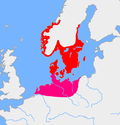Kluge's law is a controversial Proto-Germanic sound law formulated by Friedrich Kluge. It purports to explain the origin of the Proto-Germanic long consonants...
33 KB (3,851 words) - 20:15, 3 November 2023
with non-initial ⟨p⟩ are quite common; such words can come from either Kluge's law or the consonant cluster /sp/ (PIE: *p has been preserved after s). P...
11 KB (816 words) - 21:41, 4 September 2024
Germanic sound shifts (redirect from Germanic sound laws)
subfamilies and languages. Germanic spirant law Grimm's law Holtzmann's law Sievers' law Verner's law Kluge's law Germanic a-mutation Germanic umlaut (all...
922 bytes (121 words) - 23:29, 24 November 2022
to Hermann Paul. A Proto-Germanic sound law that he formulated in a paper in 1884 is now known as Kluge's law. He died in Freiburg, Germany. Wikisource...
6 KB (370 words) - 16:48, 16 January 2024
Sound change (redirect from Sound law)
spirant law Canaanite shift Cot-caught merger Dahl's law Grassmann's law Great Vowel Shift (English) Grimm's law High German consonant shift Kluge's law Onbin...
17 KB (2,334 words) - 14:15, 19 September 2024
law: for the vast majority of animals, an animal's metabolic rate scales to the 3⁄4 power of the animal's mass. Named after Max Kleiber. Kluge's law:...
78 KB (10,458 words) - 02:34, 4 September 2024
wicker 'soothsayer') and suggests Proto-Germanic *wigōn, geminated (c.f. Kluge's law) to *wikkōn. The basic form would then be the feminine, wicce < *wikkæ...
15 KB (1,696 words) - 20:40, 5 September 2024
witness in Carter v Canada (AG). Dr Kluge's complaint to the Office of the Privacy Commissioner of Canada lead to the Law School Admission Council's no longer...
9 KB (701 words) - 22:39, 30 April 2024
the suffix in the zero grade in some forms. Under the controversial Kluge's Law, a paradigmatic n in an an-stem immediately succeeding a stop consonant...
59 KB (6,273 words) - 11:13, 29 August 2024
can be explained by Kluge's law, by which geminates arose from stops followed by a nasal in a stressed syllable. Since this sound law only operated in part...
130 KB (12,136 words) - 10:03, 15 September 2024




